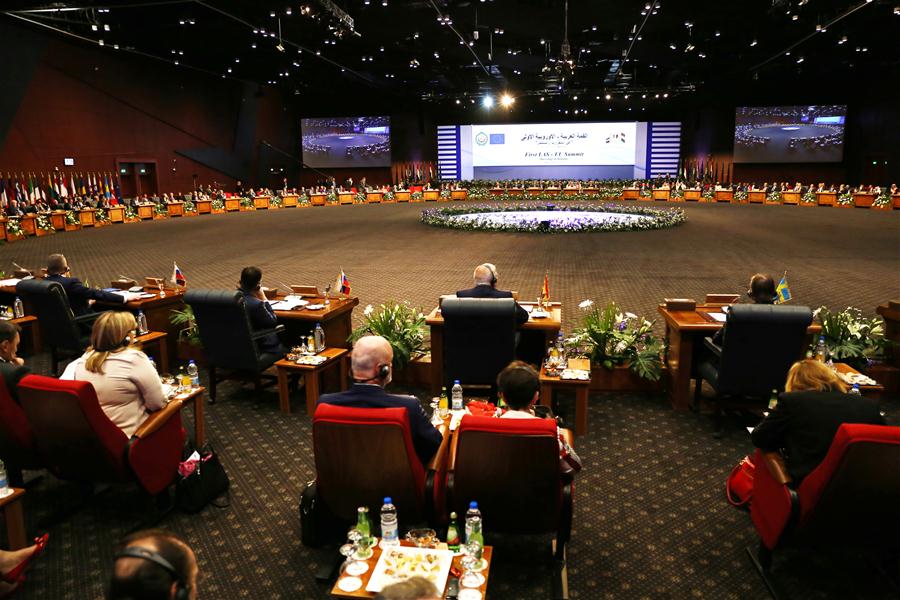EU and Arab League build new coordination mechanism
- By Hisham Abu Bakr Metwally
 0 Comment(s)
0 Comment(s) Print
Print E-mail China.org.cn, March 4, 2019
E-mail China.org.cn, March 4, 2019

On February 24, Arab and European leaders attended a summit in Egypt, seeking to strengthen cooperation in several areas such as immigration regulation, counter-terrorism, trade, investment and climate change, as well as to address key problems in the region, like the return of stability to Libya, Syria and Yemen, and the Palestinian issue.
This is the first summit that brings together the European Union and the League of Arab States at the level of heads of state and government. According to Egyptian President Abdel-Fattah el-Sissi, "The two blocs agreed to hold regular summit meetings, with the next one to be held in Brussels in 2022."
Where challenges have grown to affect not only the Arab countries themselves but the lives of people in the EU as well, the Europeans realized that they cannot achieve their own strategic objectives in the region without coordination with Arab countries.
What reasons have prompted the EU and the Arab League to establish this summit to serve as a continuous mechanism?
Confusion over illegal immigration to Europe
The phenomenon of illegal immigration is a major problem for the EU, where hundreds of thousands flow to the European continent from Africa and the Arab areas to escape from civil wars, poverty and unemployment.
For example, African illegal immigrants use the shores of the Arab countries to reach Europe, especially Libya. Moreover, many Arab countries are sheltering millions of migrants in their own territories, such as Egypt and Jordan, plus the United States, all of which need support from Europe.
The number of immigrants to the European continent in 2015 reached 1.2 million; countries of the EU have made efforts to find solutions to this phenomenon, but have failed so far.
Abandonment of the Palestinian question
Since the announcement by U.S. President Trump of the unilateral transfer of the U.S. embassy to East Jerusalem, the Palestinian authority has declared a halt to America's participation in the peace process between the Palestinians and the Israelis.
The Palestinian issue is an important issue for Arabs and the region, and is exploited by hardliners to justify their attacks on European countries and America as the biggest supporters of Israel. The Europeans and the Arabs need to discuss seriously to find a new way to bring negotiations back, and to find a solution to the Palestinian issue.
Coordination to stabilize Syria, Yemen and Libya and fight terrorism
With the United States' unilateral policy in the wars in the Arab region, the EU sees the importance of finding common ground on the part of the Arab states, and considers the implementation of UN resolutions and envoys to Syria, Yemen and Libya, as the road to ending war.
With the withdrawal of the United States from Syria, the risk of ISIL regrouping or redeploying in other areas is high, and as the EU considers the announcement of victory over ISIL premature, it will try to combine all efforts to combat terrorism.
Strengthening trade relations
The EU is seeking to increase trade with Arab countries, especially with the departure of Britain from the European Union.
The EU is third in the world in trade with the Arab nations, after the United States and China by 8.4 percent, and is fourth in imports, after the United States, China and Russia.
Last year, the EU achieved a trade surplus with 17 Arab countries amounting to 41 billion euros, in exchange for a deficit with four countries: Iraq, Libya, Algeria and Saudi Arabia, the latter owing to its oil exports to the EU.
China's position on Arab-European rapprochement
China supports the efforts of the international community to achieve peace in the region and all UN resolutions in this regard. The coordination of positions between the Arab League and the EU also serves the Belt and Road Initiative, which calls for participation in building a common future for all.
The stability of the region supports China's investment in Arab countries, especially Libya, which has had strong economic ties with China.
The cessation of war opens the way for reconstruction, which will represent an opportunity for Chinese companies to participate in construction and investment in countries such as Iraq, Syria, Yemen and Libya.
In short, the establishment of a new mechanism of communication between the Arab states and European countries is a good idea to serve the stability of the two regions, and a major step forward in meeting major challenges, although it is premature to judge the effectiveness of this mechanism.
Hisham Abu Bakr Metwally is the first economist researcher with the Central Department for Export & Import Policy under the Egyptian Ministry of Foreign Trade and Industry.
Opinion articles reflect the views of their authors only, not necessarily those of China.org.cn.
If you would like to contribute and have specific expertise, please contact us at opinion@china.org.cn.






Go to Forum >>0 Comment(s)